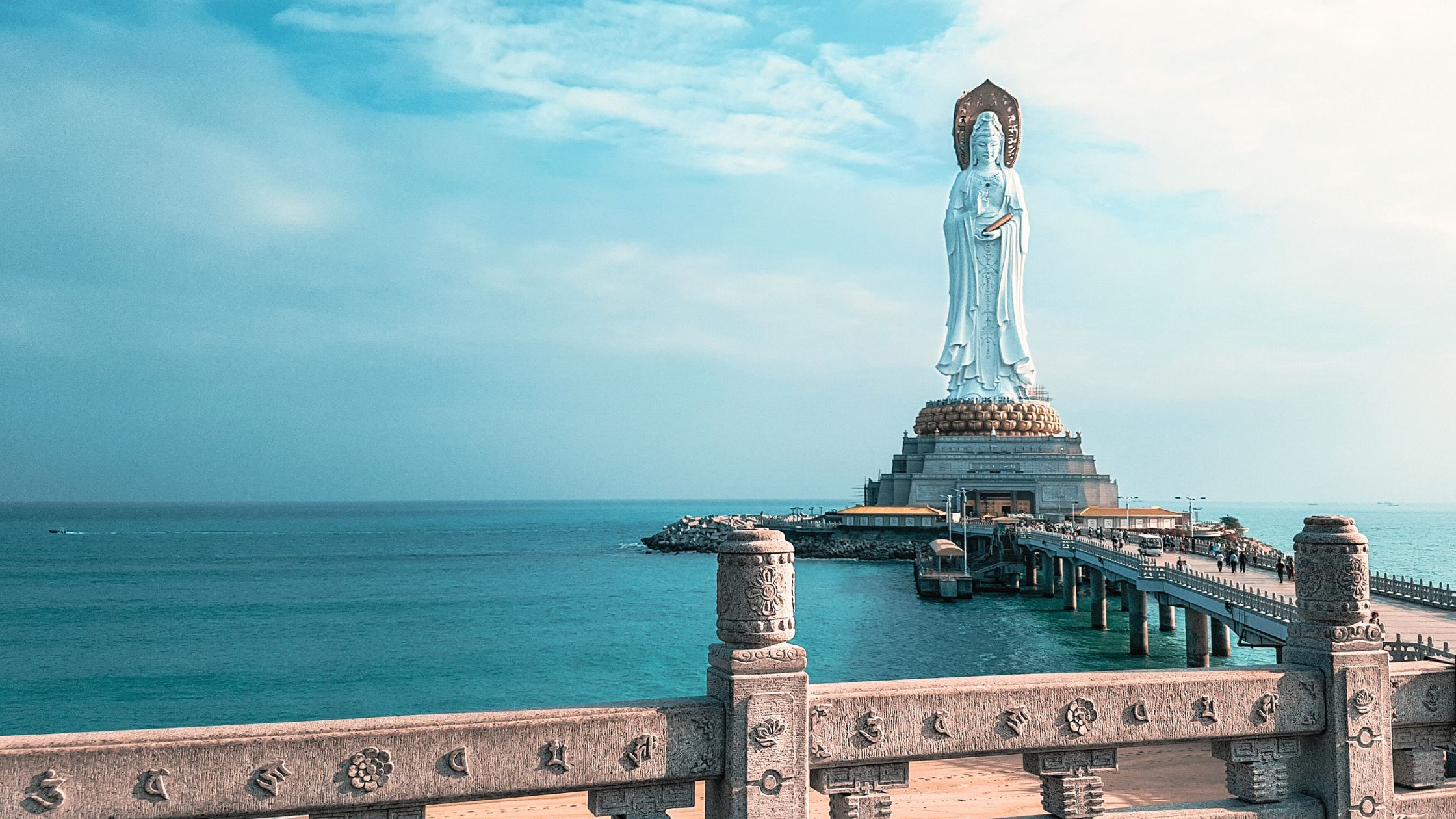Yay! You’re going to China and you’re probably on the search for some travel tips to make the most of it! Well, you’ve come to the right place!
Traveling in China is wonderful. It’s full of delicious cuisine, rich history, and wonderfully kind people. If you’re here, then you’re looking for some advice on how to do it right. Well, you’ve come to the right place again.
Below are some of my travel tips for Travelers in China, which are all based on my two years of living in China as a Peace Corps Volunteer.
1. Getting a Visa and Planning the Trip
This is one of the most important travel tips to pay attention to.
First thing’s first, when you’re getting your Chinese Visa, there are different types of Visas to apply for. You’ll need to choose the right one for a tourist. If you are not traveling to China as a tourist, then you need to choose a different type of visa. If you are traveling in China as a tourist, you’ll need an L Visa.
According to the Chinese Embassy online, you’ll need a few things to make this Visa happen:
- Passport with at least six months left and blank visa pages.
- A copy of the passport’s data page
- A copy of the photo page
- A completed visa application with a photo attached, which you can find here
- Proof of roundtrip airfare and hotel reservations
To submit your Chinese Visa application, you need to hand deliver your visa to the embassy, you cannot send it in. Not all states have a Chinese Embassy, so check the one nearest to you. If you are fortunate enough to have a trustworthy friend or family member near an embassy to deliver it for you, then try that route. If you don’t you will need a company to send in your information for you.
The benefits of having a company send in your information for you is they can get the process expedited and they will make sure you have all the correct paperwork. There are a number of Chinese Visa Services you can go through to get your Visa.
My China Visa is a reliable source or Its Easy. Service fees for a Chinese Visa can be anywhere from $69 and up in addition to the embassy’s application and processing fees.
2. Learning Mandarin Chinese
For the second tip of China travel tips, we’ll get down with the language. You may not be a language pro when you travel to China, but you can still learn the important Chinese words for beer, food, and bathroom. Everyone has a different learning style, so some people can pick up language easy and others may not.
An important thing to remember in China is that every region has a different dialect, so the likelihood of you understanding someone when they speak, may be unlikely unless they speak clearly in Mandarin, which is also very unlikely. Don’t panic yet though. All Chinese people can understand Mandarin, so they will understand you when you speak if you have the right tone and pronunciation.
Now, you can spend outrageous amounts of money on things like Rosetta Stone, but if you want to save money and still get a good product, I suggest other routes. Some resources I recommend using if you want to pick up the basic language are using Mango Languages. This resource is completely free through your public library.
I love Mango Languages because it gives you the pronunciation and allows you to listen to the pronunciation. I also love it because it breaks down and color codes them based on what type of word they are in a sentence.
For learning the basic words, I recommend first learning the numbers in Chinese so you can understand amounts when you pay for things and how to say bathroom and beer.
If you want to get real in depth with your study, I recommend using Boya Chinese textbooks.
3. Getting Used to the Crowd and Sticking Out Like a Sore Thumb
The next of my travel tips is a not entirely necessary, but it’s more of a heads up to you.
There are a billion people living and traveling in China and they all have someplace they need to be. There will be no avoiding the crowds on trains and buses. You may find yourself squished in with the crowd, so close to your neighbor that you can read their text messages. It can be incredibly frustrating, especially since us foreigners like our space.
My advice to you is to laugh at it. And I mean all of it. If you’ve been waiting for a subway for 15 minutes and it’s your turn to squish in, squish in and smile.
In China, you are different and you will stick out. It will be the first time you understand what a celebrity must feel like when they go outside into the daylight. You may have people hand their babies to you for a photo opp. They may randomly photograph you drinking coffee or eating noodles at a restaurant. This can be frustrating too, or you can laugh at this one too!
4. Best Times to Visit China
China handles the weather a lot differently than we do here in the states. They also use air condition and heating a lot differently than American’s do (as in, almost not at all). The winters in China can be pretty frigid unless you’re into that sort of thing. The summers are usually hot and humid, depending on where you go in China.
To avoid those extreme temperatures all together, I recommend going to China around late spring/early summer, or late summer/early fall. You’ll miss a lot of the heat and the cold and you’ll be able to enjoy the sights in more bearable temperatures.
As you research where you’d like to go for your trip, I encourage you to check the weather and temperatures of the region you’ll be in and prepare accordingly.
If you go in the fall, you may be able to catch holidays like Mid-Autumn Festival or National Holiday.
5. Travel Tips on the Best Places to Visit in China
So, you could totally go to Beijing, see the Great Wall of China and get the whole mainland experience.
But you’d also be visiting the most touristy part of China. I personally wasn’t as huge of a fan of Beijing as I was Chongqing and recommend getting out of the big city and seeing places outside of one of the most visited city in China. These aren’t all of the places, but just a few! You can see more cool places to visit in China here.
If I could be your inner ear I would send you to some of the places below.
- JiuZhaiGou National Park in Sichuan: An untouched national park with some of the clearest waters you’ll ever see in China. Need I say more? Just look at that view!
- Ciqikou Ancient Town in Chongqing City: While it is working toward being more urbanized, you can still duck into little corners to drink tea, have some snacks, and shop for little gifts to bring home to your friends. This little town is endless cobblestone streets you’ll love to get lost in.
- Sanya, Hainan: Depending on when you go, you can catch some sand and sun in the Hawaii of China. Plus you have the opportunity to see the Goddess of Mercy on the edge of the earth, which is a wonderful site to see. Indulge in some coconuts and their famous chicken and rice dish.
- Terracotta Warriors and Mount Hua Shan in Xi’an: Here you’ll get to see some of China’s incredible history of the infamous Terracotta army and test your strengths while climbing Hua Shan Mountain. When you visit the warriors, there are three pits, makes sure you visit the third pit first!
- Stone Forest in Kunming: For this travel tip, I recommend a place where stone rises right out of the ground like trees, gaining it its name, the stone forest.
6. Getting over the Great “Firewall” of China and Using VPNs
This one is another, or maybe even most important of all traveling in Ching tips. How do we use our favorite social media apps abroad? I used to use Pure VPN, which you could connect to your phone and your computer. It was about $50 a year.
The Great Firewall of China is a real thing and was created by the Chinese Government to prevent the citizens from seeing too much during their browsing sessions. Because of the Great Firewall of China, people can’t view things like Google, Twitter, Facebook, Tumblr, Instagram, and the list goes on and on.
In recent months, China has banned the use of your only option the VPN. You can take the risk of using a VPN (take this travel tip from me, I wouldn’t recommend it), or you can download China’s most popular networking app, WeChat.
WeChat is a useful if you want to stay in touch with your family and friends back home while you’re on your trip. And you can use this without the use of a VPN and you can send photos back and forth much like you would in a regular text message. If you’re fortunate enough to own an iPhone, good news! You can use the facetime options to stay in touch too.
If the idea of not being near Facebook or Insta for a week or two has you feeling freaked, see this as an opportunity to really take in the beautiful country! You can leave all your family and friends with the anticipation of seeing your adventures once you get back from China and have the ability to post.
7. Foods to Eat in China
Other people with China travel tips may tell you to avoid too much of the local food or hole in the wall restaurants, but I’m going the other direction. AH! Where do I even start!
The food in China is unlike anything you’ve ever had in the states. It’s true there are certain dishes that are true Chinese dishes and exist on an American Chinese menu, but most everything you have the ability to eat will be different than what you know. Some of my favorite dishes are featured below, but each region is different and has different types of cuisine! You can read more about my favorite Chongqing foods here.
- Hot Pot: Hot Pot comes in various flavors to suit anyone. Depending on the region you can have some intensely spicy hot pot or some incredibly mild hot pot.
- Noodles: You can find noodles most anywhere in China whether it is Dan Dan Noodles, Cold Noodles, Beef Noodles, or Knife Shaved Noodles. Take your pick and enjoy because the noodle selection is so large and delicious, you’ll leave China wanting more.
- Delicious Dishes: In China, it’s common for people to sit around a circular table and eat their rice out of a bowl and then pick pieces of food from a variety of dishes all situated in the center of the table. Some of my favorite dishes in China are Yu Xiang Eggplant, Tomato and Egg, Twice Cooked Pork, Kong Xin Cai, and Pickled Green Beans. Choose these dishes, or get crazy and try some random dishes from the menu. Either way, you won’t be disappointed.
- Street Food: You can probably go through all the horror stories of people who have eaten at the wrong street bbq vendor who serves questionable meat. If that’s the case, then our rule of thumb for that is “If people are eating there, it’s probably ok to eat there.” Outdoor barbeque is one of my favorite foods to indulge in. They serve uncooked veggies and meat a la carte style, give you a pan for you to pile up all your tasty meats and veggies, and then they cook it right in front of your eyes! From there, you can sit down with a group of friends and have yourself a nice little dinner or snack.
8. Maintaining Proper Hygiene and Health
For my final tip of all travel trips, I’ll talk about something incredibly important, health and hygiene. China is not very known for its cleanliness, but if you consider yourself a healthy person, you have nothing to worry about.
That said, some things you should be conscious of.
- The pollution in China is a serious issue: the locals may not always admit it. You can pack a few surgical masks with you to use on days when the pollution is bad. And there are apps to that help you monitor the pollution index and let you know if the air is safe enough or not.
- Tissues: Chinese bathrooms don’t often have toilet paper in them, so make sure to carry your own with you at all times. You never know when you might have an unbearable bathroom situation only to find out there is no TP. You don’t need to pack a gagillion before you leave your home country, and you can buy them when you arrive in China. But I can’t stress this enough. Always bring TP. Also, squat toilets are a real thing so practice your squatting.
- Always drink bottled water or boiled water: The water is poor quality and unsafe to drink from the tap. Drinking water from the tap can cause giardia which is not a fun issue to have during an adventure. I recommend drinking NongFu Spring water at all times.
- Food in China is different: it takes your body time to adjust to the differences. I know I mentioned a lot of delicious foods above, but I will say be careful of what you eat because eating at the wrong place can cause an upset stomach. The wrong thing could cause food poisoning and take you out for a few days. If this happens, make sure to stay properly hydrated. If you want to be extra cautious, bring some tablets, like Tums for indigestion.
- Stock up on Tide-To-Go Pens: China is full of delicious cuisines that have a lot of hot red chili oil involved. If you’re slurping up noodles, chances are you’re going to get some oil everywhere. Tide-To-Go pens will save your clothes from disaster!
For more information on how to travel in China, check out my blog on the best Apps to use in China or my trip to Youyang in Chongqing.










